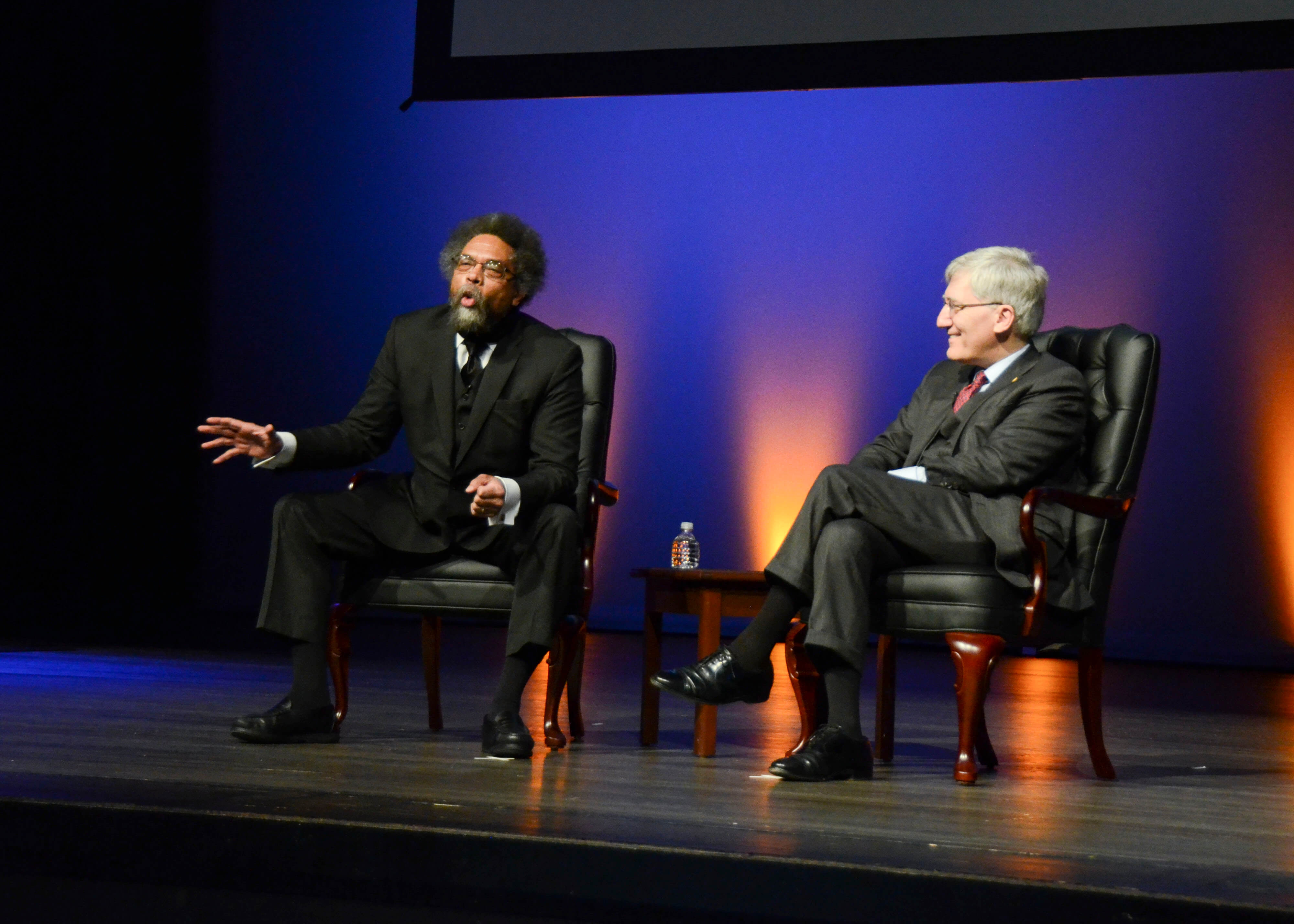NCLS event: Ivy League academics encourage cadets to seek truth in conversation

By Ray Bowden, Feb. 28, 2018
U.S. AIR FORCE ACADEMY, Colo. — Popular US academics Robert George and Cornel West disagree on politics.
It hasn’t affected their friendship. In fact, they said, their ongoing discussions have brought them closer.
“Love is not reduced by politics,” West said to an audience of cadets, faculty members and visiting college students during the professors’ National Character and Leadership Symposium presentation Feb. 23 at the Air Force Academy.
George and West sat side by side on the stage and repeatedly described themselves as “brothers” during their hour-long appearance in Arnold Hall Theater.
George, McCormick Professor of Jurisprudence and director of the James Madison Program in American Ideals and Institutions at Princeton University, ranks among the US’s most popular conservative intellectuals.
West, a professor of the practice of public philosophy and African and African-American studies at Harvard University, is an author and a Democratic Socialist.
At the symposium, they discussed the importance of seeking truth, freedom of thought and respect in any dialog, qualities they said are needed across all spectrum of American society, let alone college campuses.
“Every single of one us knows as a matter of fact that there are reasonable people of good will who see things differently than you or I do,” George said. “Every single one of us knows that there are some beliefs we all hold right here and now that are not true.”
Separating emotions from personal convictions is essential to establishing a healthy dialogue, George said.
“If we wrap our own emotions around our convictions too tightly, we become dogmatic,” he said.
True dialogue cannot without mutual respect, West said.
“Establishing a true dialogue begins with respect for the person you are conversing with,” he said. “You begin with a note of humility. Humility is aspiring to be spiritual.”
Equally important, West said, is the responsibility of all who engage in conversation dialog to seek the truth.
“We have an obligation to truth,” he said.
The men advocated for freedom of discussion at the Academy and in all academic institutions.
“Don’t draw the line too closely as to what is discuss-able and not discuss-able,” George said.
West said maintaining and open mind is a quality that’s critical to improving what he sees as the US’s lagging moral and spiritual foundation.
“What kind of persons do we want to be?” he asked the audience. “What kind of nation do we want to be?”
Editor’s note: George and West routinely speak at US colleges, admonishing the verbal and physical attacks they find all-too-common in today’s polarized political climate. They co-wrote and published “Truth Seeking, Democracy, and Freedom of Thought and Expression,” in March 2014, a statement encouraging college students to be respectful and honest during debate and arguments.
“It is all-too-common these days for people to try to immunize from criticism opinions that happen to be dominant in their particular communities,” they wrote in the statement. “Sometimes this is done by questioning the motives and thus stigmatizing those who dissent from prevailing opinions; or by disrupting their presentations; or by demanding that they be excluded from campus or, if they have already been invited, disinvited. Sometimes students and faculty members turn their backs on speakers whose opinions they don’t like or simply walk out and refuse to listen to those whose convictions offend their values. Of course, the right to peacefully protest, including on campuses, is sacrosanct. But before exercising that right, each of us should ask: Might it not be better to listen respectfully and try to learn from a speaker with whom I disagree? Might it better serve the cause of truth-seeking to engage the speaker in frank civil discussion?”
Visit www.youtube.com/watch?v=YWnaCnSQ2Ic to to watch the full event.